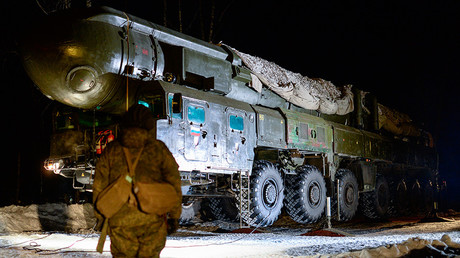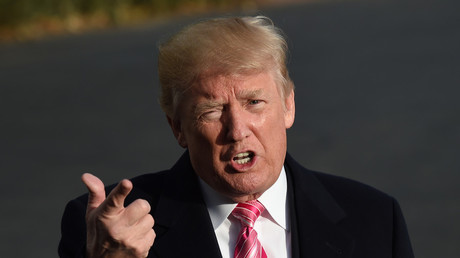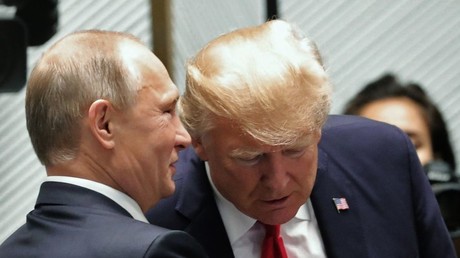A bit like imperial Rome, which bit off so much territory it eventually succumbed to dissent and ultimate disintegration, the US mainstream media also appears to be suffering from severe overstretch.
Read more

As a slew of fake news – mostly over unsubstantiated claims of Russia’s meddling in the 2016 presidential elections – cast pallor over MSM’s ethics, integrity and professionalism, it appears that is not the full extent of their problems.
Plagiarism now haunts the mainstream media mansion.
In a portentous beginning to 2018, veteran Daily Beast writer Lizzie Crocker was forced to resign over allegations she plagiarized from the Weekly Standard, a conservative publication. In fact, the prose-lifting was so conspicuous it is difficult to see how any major media outfit could have failed to detect the transgression.
Crocker’s Daily Beast piece, which is titled “How Katie Roiphe Became Feminism’s Nemesis-In-Chief,” has now been removedand replaced with an editor’s note that reads, “The story published about author Katie Roiphe violated The Daily Beast’s Code of Ethics and Standards and has been removed.”
Crocker’s very liberal approach to journalism was first noticed by Thomas Chatterton Williams, a writer for the New York Times Magazine, who announced his shocking findings on Twitter, the Daily Caller reported.
Aside from providing university-style, red-lined proof of Crocker’s indiscretions, Williams proffered the opinion that such unfortunate incidences are helping to “expose all kinds of problems in contemporary journalism.”
More on that in a moment.
First, the Daily Beast was a bit hasty to proclaim that Crocker’s breaking of the most fundamental rule in journalism was an isolated incident.
“A larger investigation of her work at The Beast has revealed no other incidents of plagiarism,” Daily Beast editor in chief John Avlon said in a statement to the Daily Caller.
Read more

That appears to have been fake news, deliberate or otherwise.
In an article published by The Daily Beast on November 19, Crocker once again employed “noticeably similar language” as an NBC News opinion column written by Alexandra Tracy-Ramirez published just days before.
Ramirez began her column with this line: “No one wants to think of someone they love, or anyone they know and respect, as a monster.”
Here is Crocker’s ingenious transformation of that opening line, with just a single word in the sentence altered: “No one wants to think of someone they love, or anyone they ADMIRE and respect, as a monster.”
Now, there will certainly be much more interest in Crocker’s body of literary work, as people begin to wonder exactly how much she borrowed from other writers. Imitation is the highest form of flattery, right?
In any case, there is another problem with contemporary journalism that goes far beyond an isolated act by a misguided reporter, and in many ways, is far worse.
Today, as the Big 6 mainstream media titans begin to lose their grip on the global narrative that they once controlled lock, stock and barrel, they are taking devious steps to halt the hemorrhaging.
As mentioned earlier, the unsubstantiated claims about Russia meddling in the presidential election between Donald Trump and Hillary Clinton forced the US establishment to declare war on “alternative news sources.”
Suddenly and inexplicably, a dizzying array of news stories demonizing Russia was grabbing headlines on a daily basis, accusing the Kremlin of everything from hacking the US power grid, to even hacking civil rights movements.
And since we are talking about Russia, the perennial bogeyman, retractions are rarely, if ever, issued over fake news stories. The result is that the reader doesn't know what is fake or non-fiction.
Read more

The tempestuous tempo of anti-Russia insanity has not slowed today. This was witnessed by the latest social-media-inspiredconspiracy theory that Russia actually got whistleblower Chelsea Manning to enter the 2018 Senate race. Do these people have no shame?
Yet, there seems to be some method to the madness.
Following the principles of the Hegelian Dialectic, the media powers-that-be are employing a problem-reaction-solution model in an effort to reclaim the media high ground.
In November 2016, the fake news horse left the gates with a Washington Post story so glaringly inept and barren of facts it made Crocker’s work shine by comparison.
In the article, entitled "Russian propaganda effort helped spread 'fake news' during election, experts say," writer Craig Timberg cited a group called ProporNot, which “identifies more than 200 websites as routine peddlers of Russian propaganda during the election season, with combined audiences of at least 15 million Americans.”
Even the venerable Ron Paul Institute managed to get scooped up in the net.
In more medieval times, such a brazen declaration, without a thread of proof, would be labeled a witch hunt or inquisition. These days, it just passes for your run-of-the-mill journalism.
Matt Taibbi, a writer for Rolling Stone, weighed in on the article, saying it has “no analog I can think of in modern times.”
“The meat of the story relied on a report by unnamed analysts from a single mysterious 'organization' called PropOrNot – we don't know if it's one person or, as it claims, over 30 – a 'group' that seems to have been in existence for just a few months,” Taibbi wrote.
Read more

Taibbi called into question the professionalism at the Washington Post for permitting a story to pass go based on the “dicey”findings from an outfit that just appeared on the scene.
“Any halfway decent editor would have been scared to death by any of these factors,” Taibbi noted. “Moreover the vast majority of reporters would have needed to see something a lot more concrete than a half-assed theoretical paper from such a dicey source before denouncing 200 news organizations as traitors.”
But that is where we are at this dangerous juncture in the media jungle. Facts have become mere playthings that can be manipulated at will, while even repeated acts of plagiarism manage to escape the notice of editors.
It is exactly such a low level of professionalism that permits the toxic atmosphere of anti-Russia news reporting to fester, helping to destroy US-Russia relations, not to mention the hard-won trust of mainstream media consumers.
The American people deserve better. But since the US mainstream media cannot tolerate any alternative news source that offers its readers a different perspective, consumers will have to read carefully between the lines in order to sift fact from fiction.
@Robert_Bridge